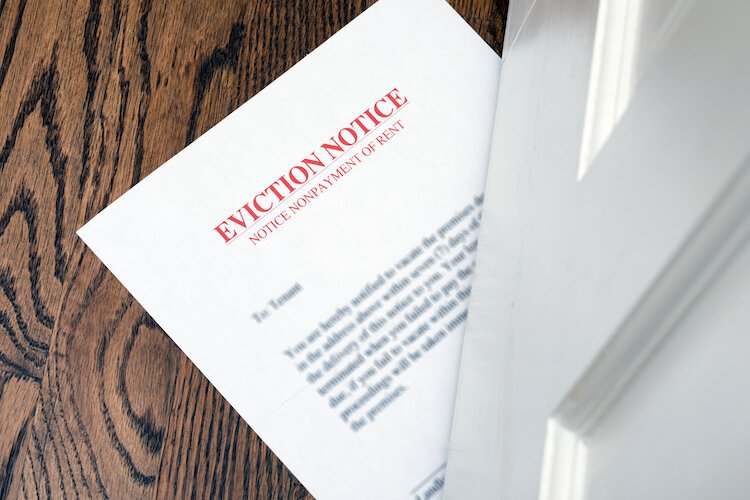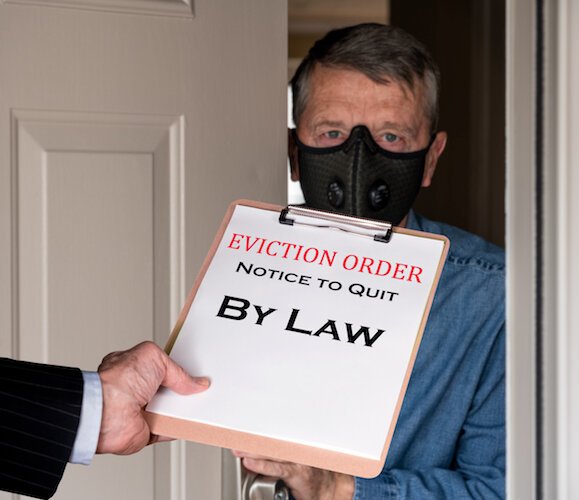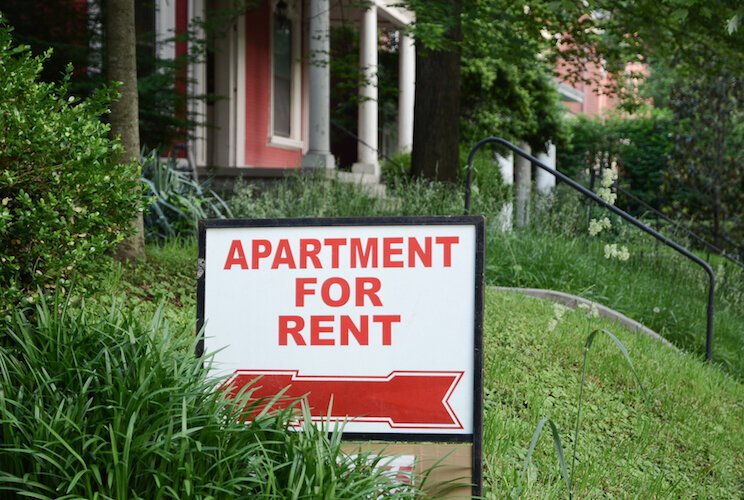Kalamazoo renters group worries: When will COVID-deferred landlords come knocking?
The Greater Kalamazoo Renters Union is worried that widescale evictions are coming for those who are unemployed due to the economic shutdown caused by COVID-19. Programs can help renters stay in their homes, city officials respond.
Editor’s note: This story is part of Southwest Michigan Second Wave’s On the Ground Kalamazoo series and our ongoing COVID-19 coverage. If you have a story of how the community is responding to the pandemic please let us know here.
Landlords in the state of Michigan can once again evict tenants for nonpayment of rent.
The moratorium on doing so – which was in effect over the past few months to protect people who have lost work or suffered significant economic hardship as a result of the coronavirus pandemic – expired Wednesday (July 15).
Will that mean widescale evictions for what may be hundreds of area people whose monthly rent has been deferred? The Greater Kalamazoo Renters Union is worried that it will.
Executive orders that closed thousands of businesses and directed hundreds of thousands of workers to stay at home to stay safe from the spread of the coronavirus, caused a huge economic disruption for many.
“Some people got aid. Some people are still waiting on it. And, as you know, bills pile up,” says Andy Argo, spokesman for the group that started as an idea more than a year ago then gelled into a 42-member organization of renters when the pandemic hit in March. “It created huge financial instability for a lot of people. Some people in Kalamazoo have not been able to find work, even those who are looking for it.”
That is particularly true of those in working-class neighborhoods “such as Vine, Eastside, and Edison,” he says.
His group, the Greater Kalamazoo Renters Union, is trying to be a unified voice for renters.
“The whole idea around this is when renters stand together, they are more powerful than any renter alone,” Argo says. “We can use that collective power to push for things like affordable housing (and) push against housing evictions and amoral and unlawful evictions.”
The group recently petitioned the Kalamazoo City Commission to ask the state of Michigan for the authority to declare a local state of emergency that would allow the commission to: Forgive residential and small business back-owed rent resulting from pandemic-related financial hardship; Obligate landlords to offer lease extensions to all tenants at pre-COVID rates; And publicly declare the need for a federal rent and mortgage forgiveness fund.

The petition is modeled on one that was adopted by the town council of Ithaca, N.Y.
City officials respond, saying help has been made available to those in need and more help, in the form of the state-backed and federally-funded Eviction Diversion Program, is on the way. That program, which was to go into effect today (Thursday, July 16), is set to provide municipalities with shares of $50 million in federal CARES Act funding. (CARES is the federal Coronavirus Aid, Relief and Economic Security Act). The city of Kalamazoo has been allocated $1.3 million, says Mayor David Anderson.
While he says, “I’m worried every time there’s an eviction,” Anderson says professionals involved in sheltering people and those involved in local housing assistance have been meeting weekly via ZOOM to try to prepare for the possibility of an increase in the number of evictions. At the same time, he says, “We don’t have data right now that tells us that there absolutely will be (an increase). There’s no good way to tell because (eviction) filings have not been allowed.”
Anderson, who is a longtime member of the Kalamazoo County Public Housing Commission and works as director of housing and facilities for Integrated Services of Kalamazoo (formerly Kalamazoo Community Mental Health), says there is anecdotal evidence that people are worried. But there is also evidence that people are managing. Many have been able to get unemployment insurance benefits and many landlords have been getting rent payments, he says.
Working with community development block grants and organizations like LISC and the Kalamazoo Community Foundation, the city has already been able to make more than $720,000 in eviction relief funding available to people economically affected by the pandemic, he says.
While she says she thinks some landlords are waiting to file eviction notices to collect back-owed rent, or are waiting to have their previous cases heard, Debra Miller, code enforcement supervisor for the city of Kalamazoo, says, “I really don’t have a feel for how many.”
She says she does not know if there is a real reason for renters who have lost work as a result of COVID-19 to worry.
“I would think that if tenants have taken the opportunity to talk to landlords, they may be able to work something out,” Miller says. “But it’s difficult on both sides.”
She said the city tries to stay neutral on such matters as contractual issues between tenants and landlords.
“Our job at the city is to ensure property is registered and certified,” she says. “This is hard enough most of the time. We see good and bad on both sides. We let the courts deal with the evictions.”
Anderson says, “From a landlord’s perspective, you’ve got to be thinking, ‘Well, these people were paying the rent before and they haven’t (missed). What’s the new group of (potential) tenants out there look like? Maybe it’s in my best interest to work with them and help them get this benefit so we can get back up whole again.’”
He said landlords already do that with an eviction diversion program that has operated through the Kalamazoo County court systems for many years.
“The agency that does the eviction diversion work in town, the point agency for that is Housing Resources Inc.,” Anderson said.
It is the organization through which renters will apply for help via the federally-funded Eviction Diversion Program that launches today (July 16).
Anderson’s recommendation to concerned renters: “Communicate with your landlord. Don’t ignore them. Tell them what you are doing. Tell them that these programs are available. Tell them that you are applying and you’re going to be seeking resources for all of those things. Communicate, communicate, communicate.”
Executive Director Chris Moore says the Kalamazoo Collective Housing continues to forgive monthly lease payments for four to six of the 24 residential tenants it has at six properties it owns in the Vine Neighborhood. The number of forgiven rents has dropped since May when there were 11.
“We have no intention of stopping that program anytime soon,” Moore says. “We still have funds available for folks who need it. And we haven’t seen a significant change in our members’ incomes. The need is still there.”
The effort has cost the 13-year-old, member-owned nonprofit organization about $6,000 per month. But it remains committed to its mission of providing affordable housing.
Argo says, “While there has been some government relief that has come down the pipeline, there are still so many gaps. There are a lot of people who are still struggling, still waiting for their money. We want to make sure anybody who is facing eviction, knows their rights, has some idea about what they can do next. Basically, we’re trying to get people collected together so that if a mass eviction crisis does come to pass, people are ready legally and people are ready as a community.”
How to get help
The Michigan State Housing Development Authority is administering the just-launched Eviction Diversion Program through its network of nonprofit homeless service providers. They are known as Housing Assessment and Resource Agencies (HARAs). Housing Resources Inc., at 420 E. Alcott St., is the HARA for Kalamazoo. It will manage an eviction diversion process in which tenants and landlords are notified about the program and eviction filings are resolved in as many cases as possible by conditional dismissals.
A tenant being evicted from his or her rental may contact Housing Resources Inc. at 269-382-0287.
Rental assistance payments are set according to a tenant’s income. Those who earn 50 percent of the area median income are eligible for assistance to pay up to 90 percent of the rent they owe (up to $3,500) and one month’s rent (up to $1,200) going forward. Those who earn 50-80 percent of the area median income are eligible for 75 percent of the rent they owe (up to $3,000). Those between 80-100 percent are eligible for 65 percent of their rental arrearage (up to $3,000). And those above 100 percent of the area median income are not eligible.
Participating Landlords may receive up to 90 percent of their tenant’s back-owed rent, paid in a lump sum. They are required, however, to forgive late fees and up to 10 percent of the back rent.
More information is available from the Michigan State Housing Development Authority here.


















